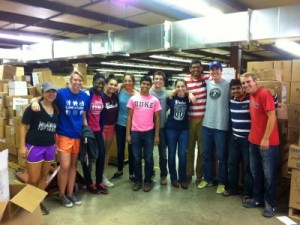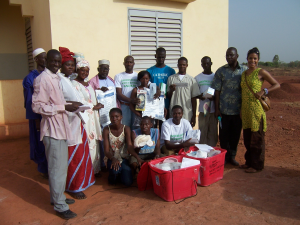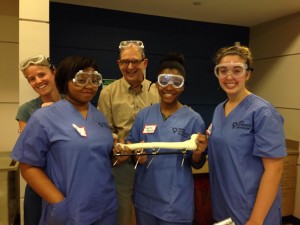 In his spare time, John Lohnes, Duke orthopaedic physician assistant coordinates REMEDY at Duke, a volunteer program that collects surplus medical supplies from the health system to donate to medically under-served areas overseas. In 1996, several Duke medical students began collecting usable surplus from Duke Hospital to donate to various charities doing overseas work. In 2004, interested staff, students and administrators reviewed the safety, compliance and liability issues associated with this effort and the Health Center approved a more formal process for handling surplus supplies. At that time the program adopted the name “REMEDY at Duke”, using the REMEDY model developed at Yale University currently in use at many hospitals throughout the United States. In recent months John has been working with Duke employees from Liberia and Sierra Leone to coordinate shipments to west Africa to help with the Ebola outbreak.
In his spare time, John Lohnes, Duke orthopaedic physician assistant coordinates REMEDY at Duke, a volunteer program that collects surplus medical supplies from the health system to donate to medically under-served areas overseas. In 1996, several Duke medical students began collecting usable surplus from Duke Hospital to donate to various charities doing overseas work. In 2004, interested staff, students and administrators reviewed the safety, compliance and liability issues associated with this effort and the Health Center approved a more formal process for handling surplus supplies. At that time the program adopted the name “REMEDY at Duke”, using the REMEDY model developed at Yale University currently in use at many hospitals throughout the United States. In recent months John has been working with Duke employees from Liberia and Sierra Leone to coordinate shipments to west Africa to help with the Ebola outbreak.
With the added help of Duke warehouse staff and student volunteers they have to date sent over 30 pallets of surplus supplies, including masks, gloves, gowns, and antiseptics to Sierra Leone and Liberia. These are all materials that otherwise would have been discarded.
John encourages others in the Orthopaedic Department to consider volunteering some of their spare time to the REMEDY program, not only related to the current Ebola outbreak in Africa, but for the many other global health projects the program supports throughout the year. Any of our medical providers may request supplies for global health projects they are involved with.
For more information on the REMEDY program as well as how to volunteer, please contact John Lohnes or visit their blog at http://sites.duke.edu/remedy.




